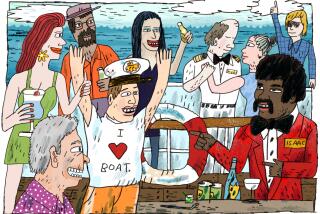Coupon Settlements Offer Little Help to Consumers
- Share via
The good news for Wayne and Claire Hildebrand of Blue Jay, Calif., came by mail a few months ago: As past customers of Royal Caribbean International cruises, they were entitled to a share of a multimillion-dollar settlement in a class-action suit against the cruise line.
The bad news came in the same envelope: Instead of cash, their settlement “payment” was $76 in discount certificates.
These certificates, sent to 3 million past Royal Caribbean passengers in the second half of 1999, can be used only toward purchase of another cruise. They lose all value if not used by August 2002. No more than $100 in vouchers can be applied toward the cost of a seven-night cruise (which typically costs $800 per person or more). The vouchers are good only if booking within four months of embarkation--short notice in an industry in which booking eight months in advance is common.
“The value of the vouchers is nil,” Wayne Hildebrand says. In a Jan. 31 letter to Royal Caribbean, he asked for a check instead. But the small print on back of the vouchers says they’re not redeemable for cash. As of press time last week, the Hildebrands had heard nothing.
In coming years, perhaps even coming months, quandaries like the Hildebrands’ are likely to affect millions more travelers.
The cruise industry is following a strategy pioneered by the airline industry in the 1990s, one that’s increasingly common in class-action lawsuits over consumer products. The idea is to pay off your legal enemies with vouchers for your product instead of real money--a move that many consumer advocates denounce.
In the airlines’ case, nine carriers were accused of price-fixing in a 1990 lawsuit. In 1993 they elected to deflect the case (without acknowledging wrongdoing) by sending out $400 million in vouchers that were even more tightly restricted than those sent by Royal Caribbean.
The Royal Caribbean lawsuit covers consumers who cruised between April 19, 1992, and April 1, 1997. During that time, Royal Caribbean was accused of deceiving customers by assessing “port fees” that included not only passed-along government taxes but also non-tax operating expenses.
The voucher settlement strategy isn’t quite as absurd as, say, the idea of a tobacco firm settling its legal troubles by selling cigarettes at a small discount. But there are parallels, as critics such as Ralph Nader’s consumer advocacy group Public Citizen like to note.
“At the very least, you have to be very, very wary of coupon settlements,” says Brian Wolfman, staff attorney at Public Citizen in Washington, D.C. “They frequently provide no value to the vast majority of class members”--that is, the consumers represented in a class-action suit. “It’s a total perversion of the equal justice notion of our civil justice system.”
Like forgotten gift certificates and unredeemed frequent-flier miles, an unused voucher costs its issuers virtually nothing. Further, if a voucher amounts to less than 10% of a sales price and can be used only if a customer commits to spending hundreds or thousands of dollars, is it a penalty or a marketing tool for the company that it’s supposed to be penalizing?
Wolfman’s advice to consumers: If you’re notified of a pending settlement involving vouchers and you don’t like it, object to the court in writing, saying you want cash instead. These settlements typically depend on approval from a judge, who can require better terms. Consumers can also request exclusion from a class action. That way, although they get no coupons, they retain the right to file their own suit, Wolfman said.
Why do plaintiffs’ attorneys accept voucher settlements? Because, one says, they’re better than nothing.
“A lot of people react very negatively to vouchers and the idea that you have to buy a product from the person who ripped you off,” acknowledges Joseph Lipofsky, whose New York firm, Zwerling, Schachter & Zwerling, handled the Royal Caribbean case and several others. The question, Lipofsky says, is whether you hold out for cash or settle for something less than cash. “That’s a judgment call,” he says.
Lipofsky adds that some vouchers are far more valuable than others, depending on their restrictions. If a voucher-holding Royal Caribbean consumer doesn’t want to take another cruise, he says, “you can give them to your friends and relatives and neighbors. And, more importantly, you can sell them.”
But Wolfman at Public Citizen scoffs at the idea that anybody would pay much for such closely restricted coupons. Other consumer advocates posit another possible explanation for so many voucher settlements: Either way, the plaintiffs’ attorneys take their fees from the defendants in cash.
In the Royal Caribbean case, Zwerling, Schachter & Zwerling (which spent two years wrangling with the cruise line and the federal court system) collected $1 million in fees. In the 1993 airline settlement, plaintiffs’ attorneys asked for $24 million, which a judge reduced to $14.4 million.
The same port-fees pricing practices that sparked the Royal Caribbean suit were targeted in a flurry of lawsuits against other cruise lines by Florida’s attorney general and others. Like several other lines, Royal Caribbean admitted no wrongdoing but agreed to change its billing practices. The combined theoretical value of Royal Caribbean’s vouchers is probably “around $100 million,” according to Lipofsky. How many will actually get used? “I have no idea,” he says.
In the airline voucher case, an estimated 12 million people qualified for vouchers, of whom about 4.3 million wrote in with evidence that they had traveled on the airlines, as the settlement required. Industry veterans guess that well below 10% of vouchers actually got redeemed. “It’s the landmark of how not to do a voucher settlement,” Lipofsky says.
*
Christopher Reynolds welcomes comments and suggestions, but cannot respond individually to letters and calls. Write Travel Insider, Los Angeles Times, Times Mirror Square, Los Angeles, CA 90053, or send e-mail to [email protected].
More to Read
Sign up for The Wild
We’ll help you find the best places to hike, bike and run, as well as the perfect silent spots for meditation and yoga.
You may occasionally receive promotional content from the Los Angeles Times.







